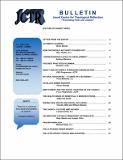JCTR Bulletin 3rd Quarter 2011

View/
Date
2011Author
Jesuit Centre for Theological Reflection
Type
BulletinLanguage
enItem Usage Stats
64
views
views
33
downloads
downloads
Abstract
A few weeks ago Zambia witnessed yet another relatively peaceful change of government, the first having been
in 1991 when multiparty democracy was introduced. Needless to say, this phenomenon is unprecedented in the
African political landscape. Ever since the new Government was sworn in, we have had various
pronouncements, promises and appointments that certainly bring hope to many Zambians. More concretely, we
have witnessed a reduction in the price of fuel, which many hope will contribute to the reduction of food prices
and other services. Whilst these developments seem positive and promising, we can only hope that they are a
sign of the transformation that the country stands in need of, and not simply a political transition from one
government to the other.
Our African experience has taught us that a mere hand-over of power by one government to another does not
in itself bring any significant change in a country if there is no positive change in the manner in which the
country is governed. Many Africans in post-independent Africa were quickly disillusioned when it became clear
that the freedom and prosperity they had hoped liberation from colonialism would bring were still far from
realisation. After fighting for liberation from colonialism, they had now to fight for liberation from their oppressive
governments. This was mostly because the independent states simply maintained the oppressive institutions
and behaviour of the colonial governments and did not transform them for the creation of new political societies.
It was a transition without transformation.
